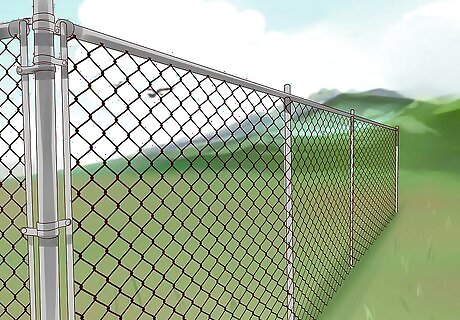
views
X
Research source
[2]
X
Research source
Keeping Intruders Out

Build walls and fences. A wall or fence along the border of your property is one of the simplest ways to keep other people out, as well as putting would-be intruders on notice that the land within is private property. If you live in a suburban community, make sure the type of fence you want to build is allowed before you begin construction. You also may want to have a survey done to establish the exact boundaries of your property as set forth in your deed. Talk to any adjoining property owners before you construct a fence or a wall. Many state laws and local ordinances require neighbors to share the responsibilities of maintaining a fence between properties. If your property sits next to a road or other property, you also should check state laws and ordinances to determine what set-off is required.

Post signs. Although warning signs won't keep anyone off your property in and of themselves, they can serve as a deterrent and put people on notice as to the consequences if they trespass on your property. Security company signs or window stickers can serve as a deterrent even if you don't have an alarm system installed. Theft often is a crime of opportunity, and these notices send the message that your property is not an easy target. You also can get signs that say "Beware of Dog" or similar at most home improvement stores. Other gadgets can be used to simulate the presence of a guard dog or security guard on the premises.

Install an alarm system. Even if you live on the property, you can't personally monitor it all the time. Perimeter alarms and motion-detection systems can alert you to intruders on your property so you can take action. Many alarm systems also automatically contact authorities. Get terms and estimates from several alarm companies before you choose which one you want to buy. Read the contract carefully and make sure you understand what is covered and what isn't. Pay particular attention to early-termination clauses, so you know what you'll have to pay if you decide to cancel your service for some reason. You might also consider exterior lights with motion sensors, which can help defend your property from intruders as well as provide well-lit pathways if you're walking the property at night.

Review and update your security regularly. As soon as new security technology is released, there will be intruders who figure out how to get around it. Stay ahead of the curve by updating your system when you learn of potential vulnerabilities. Run tests to check for weaknesses, such as attempting to enter the property with all security in place. If you have an alarm system, let your alarm company know ahead of time that you're conducting a test so they don't send a false alarm to the police. Police precincts often do home inspections as a service to local residents. A law enforcement officer will walk your property with you and identify weak points in your security. If you have a fence, check it regularly for holes or other damage. You also should check any locks on gates or doors and make sure they function properly.

Keep up to date on state law. Each state has its own laws regarding the use of force to protect your home or private property. Typically these laws require an evaluation of all the circumstances of the situation to determine whether the amount of force used was reasonable. State law is particularly important if you've hired a security guard to patrol a large parcel of land. Use of force may differ depending on whether there is a home or the property is undeveloped. Each state has laws that fall under the legal theory known as the "castle doctrine" (following the adage that a man's home is his castle), which permits use of deadly force to defend your home and property. However, castle doctrine laws typically don't apply to undeveloped land, or to a significant expanse of property far removed from your home. In most cases, you must be able to prove the force used was immediately necessary to stop or prevent illegal actions. Deadly force typically is only justified if immediately necessary to protect a life – not to protect property alone. #*No state permits you to set up mechanical devices or booby traps to stop intruders on your property.
Preserving Your Boundaries

Have your property surveyed. A professional surveyor can mark the legal boundaries of your property according to the deed, which will alert you to any potential conflicts or property description issues. A survey can help you determine if your property blocks a neighbor's access to the road, or to a shared asset such as a lake or beach. Surveys also mark the location of underground cables, drains, or pipes used by water, gas, and other utility services. If the property description in your deed uses natural barriers such as a river or a cliff, these may have moved with time depending on when the description was written. Similarly, if the property line runs with an artificial barrier such as a highway, the legal description may be problematic if that artificial barrier has been destroyed or altered.

Create contracts for agreed uses. Written contracts protect your land rights by ensuring that someone's continued use doesn't diminish them over time. Without a written contract, users can acquire prescriptive easements that restrict your rights to the land. For example, if you have lakefront property and the person who owns the land next to yours uses a path that runs through your property to get to his favorite fishing spot on the lake, and you're okay with that, have him sign a contract describing that use. Your contract typically doesn't need to use any formal language or legalese, but it does need to describe who has the right to use your land, how they have the right to use it, and for how long. Keep the term of these contracts relatively short so you can revisit the situation every few years. Include a statement in the contract that the other person acknowledges that your land is private property and you reserve the right to terminate their usage at any time. You also want to make the usage rights conveyed in the contract non-transferable. The contract only applies to you and this person – if they move away, your new neighbor can negotiate a new contract with you.

Record land-use contracts with your county recorder. Any contract that defines an agreed use of a portion of your land, or a compromise regarding a fence or other structure, should be recorded along with your deed so an easement can't be created. Keep in mind that while there aren't any legal formalities for the contract itself, there might be if you want it recorded. Many states, for example, require contracts having to do with the sale or use of land to be signed before notaries and witnesses. However, keeping the contract with your deed ensures there's never any question about your ownership and protects your rights. You must pay a fee to record the contract, typically under $50. Call your county recorder's office or visit their website to find out the specific requirements.

Monitor the use of your property. Since someone using your property can create a prescriptive easement with as few as five years of continuous use, it's important to regularly walk your property and look for signs of use by others. Particularly if you have a large parcel of land, you may not be able to keep watch over all of it all the time. However, it takes years for another person to assert rights to your land based on their continual use. For large parcels, you might want to consider breaking it up into zones and going over one zone each month. When you walk your property, bring along some caution tape or signs. If you see signs of use, such as litter or a worn-down path, place a marker there with a sign warning the interloper that this is private property. Make a note of spots where you noticed signs of use so you can check them more frequently.
Blocking Other Uses

Research water and mineral rights. Check all documents related to your property, including your deeds as well as any active leases or mortgages, to determine whether you have water or mineral rights in your property. Since most real estate in the U.S. is transferred as a fee simple estate, in which the purchaser has complete ownership of the land both above and below the surface, you may have rights to any water or minerals below your land as well. However, water and mineral rights can be severed from surface rights, so it also is possible that someone else owns those rights – especially if you recently purchased the land. An existing deed or lease for mineral or water rights could seriously impact your surface land rights if the mineral or water is extracted. Water and mineral rights can be exceedingly complex, so if you run into problems or have questions, consider consulting an attorney with experience in mineral or water law.

Contest eminent domain. If you receive an eminent domain notice from a government agency, you have the right to contest the taking by requesting a hearing and having additional appraisals conducted to ensure you're getting fair compensation. An experienced attorney can help you protect your land rights if you're faced with an eminent domain proceeding. You have the right to object to the government's exercise of eminent domain. Challenges questioning the government's use typically are unsuccessful as long as the judge considers the government's use proper. However, you may be able to successfully argue that the government's use can be satisfied by taking less of your land than was originally requested.

Consider creating a conservation trust. States and counties provide the opportunity to put your property into a conservation trust, or create a conservation easement, which will protect and conserve the land in virtually the same condition, restricting exploitation and development. Depending on the complexity of the easement you want to create and the size of your land, a conservation trust or easement could take several months up to a year to finalize, so make sure you plan ahead. You must complete research and documents related to your land's legal description, deeds, surveys, and assessments of mineral and water rights in your land. Creating a conservation easement often includes property tax benefits, and also may offer significant savings on estate taxes after your death.




















Comments
0 comment